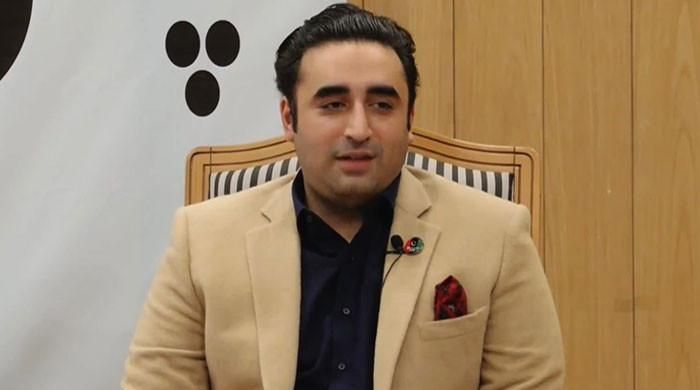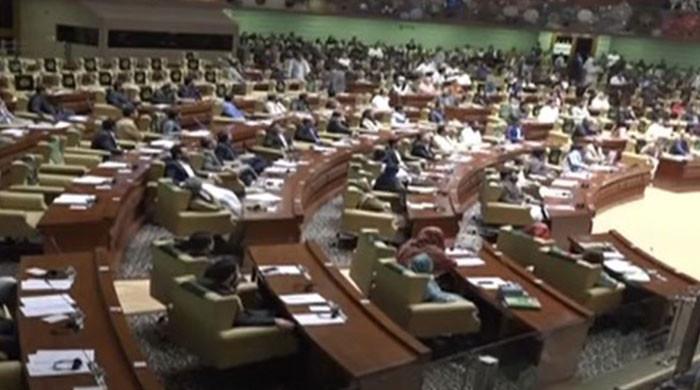Politico believes that “powerful lobbies” react strongly to any measure to abolish 17 ministries
- Bilawal Bhutto interacts with students of SZABIST Islamabad.
- Politico explains the salient features of the PPP manifesto economic plan.
- “Providing relief to weak segments, top priority for those affected by floods.”
Bilawal Bhutto-Zardari, president of the Pakistan People's Party (PPP), calling his party's manifesto a remedy for all crises ahead of national elections, has blamed “powerful lobbies and bureaucracy” for the long-standing problems of the country.
Bilawal was interacting with students of Shaheed Zulfikar Ali Bhutto Institute of Science and Technology (SZABIST) Islamabad campus on Monday regarding his party's manifesto. “Chuno Nai Soch Ko (Choose a new thought).”
Promising strict measures to end the control of elites and powerful lobbies, the PPP president reiterated his promise to provide relief to the underprivileged segments after abolishing all subsidies to the upper class of the society.
The electoral campaigns of all political parties, equipped with manifestos and appeasement promises, are in full swing across the country ahead of the February 8 elections. The PML-N and PPP are eyeing the prime minister's office and desperately influencing voters to elect them to power.
“Inflation, poverty, unemployment and climate change are key issues facing the country and must be addressed on a priority basis,” the PPP chief said, adding that the economic crisis poses a serious risk to Pakistan.
He said he and economic experts prepared the party's manifesto, promising a pro-public economic plan to deal with all crises and immediate relief to the masses.
“Elites, powerhouses and the fertilizer industry receive annual subsidies worth Rs 1,500 billion in our country. “We will end all subsidies to the elites and spend the funds to provide aid to the disadvantaged segments.”
“We will abolish 17 ministries if we win power. The country will definitely see economic stability if we invest in the agriculture, communications and energy sectors.”
Elaborating on the expected difficulties in the implementation of his plan, Bilawal admitted that “powerful pressure groups create problems and a powerful reaction will come from the powerful sector after the abolition of the ministries.”
The politician explained his experience while serving in the previous Pakistan Democratic Movement (PDM) government as foreign minister. “I spent 18 months in the federal government and knew the mentality of the Islamabad bureaucracy.”
Bilawal, who blames bureaucrats for hindering the country's progress, said: “They don't want to work and they don't want anyone else to do anything.”
He believed that the nation would definitely support those rulers and their policies who provided them with 300 units of free electricity and other facilities.
Bilawal said the country is facing serious consequences of the politics of division and hatred. Defending his point of view, the politician stated that no one could implement any manifesto without changing the mentality.
He added that the PPP could create green jobs for the nation and successfully address long-standing national problems by providing relief to the weak segments and flooding the affected at the top if elected to power.
After presenting the manifesto, the Bilawal-led party will also launch the “Bhook Mitao Programme”, which will ensure food security, with the aim of making nutritious food available at affordable prices, boosting domestic production, subsidizing producers local and connect women with the market. economy as active entrepreneurs.
The party had previously announced the following 10-point agenda for the manifesto:
- Double the real income of wage earners: increase of 8% each year
- 300 units free solar power for poor; Each district will have green energy parks.
- Education for all: implement projects for better education
- Free healthcare for all throughout Pakistan
- Three million houses for those affected by floods and the poor
- Ghurbat Mitao: Expand the reach of BISP; introduce more wellness plans
- Khushhaal Kisaan: BISP-like program for farmers and 'Hari Card'
- Improved support for workers through Benazir Mazdoor card
- 'Youth Card' for unemployed young people and 'Youth Brand'
- 'Bhook Mitao Program'












